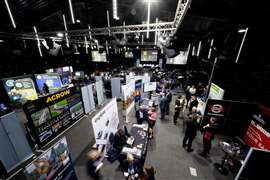What did we learn from the CPA Conference?
16 December 2024
 Photo: CPA
Photo: CPA
Last month the Construction Plant-hire Association (CPA) held its annual Conference in Coventry, with no topic off the table as the industry came together to discuss the key challenges facing UK rental companies.
The timing could hardly have been better, coming just a week after the autumn budget. Here’s some of the things we learned at the event.
The sector plays a bigger role in the UK economy than previously thought
It was revealed before the event that the organisers would be unveiling a new report on the UK rental sector that promised to shed new light in the industry.
The report certainly did that, revealing the direct, indirect and induced impact on the economy for the 2022 financial year.
One of the biggest findings of ‘The Economic Impact of the UK Construction Plant-hire Sector’ was that UK firms accounted for £10.5 billion in revenue for the same period, supporting a direct contribution of £6.4 billion to UK GDP via employee wages, salaries, business profits and taxes on production.
What’s more, it said that its indirect contribution to the economy was roughly £3.2 billion, which was generated by supply chain spending on new equipment, fuel, office supplies and external services such as legal and accounting.
In terms of employment, research from Oxford Economics found that for every 100 people directly employed by construction plant-hire, the sector supports a total of 216 jobs around the economy.
The sector employed an estimated 88,600 workers in 2022, with those found to be 25% more productive than the UK average, while it also estimates that the sector indirectly accounted for 44,800 jobs through supply chain purchases, most notably in manufacturing (9,600), administrative ourchases (7,700) and retail & wholesale (7,200).
Additionally, workers employed by plant-hire companies were said to have contributed £4.4 billion through wage spending on real estate (£1.1 billion), retail & wholesale (£650 million) and financial services (£405 million).
Speaking to IRN, Chris Cassley, policy manager, CPA, said the report demonstrates the productivity within the sector and can be used as a tool when it comes to speaking with government or to other construction trade associations
A full review of the report can be found here.
AI remains a key topic among renters
 From left to right: Peter Haddock, Brian Jones, Asif Latief and Kathryn Adams. Photo: CPA
From left to right: Peter Haddock, Brian Jones, Asif Latief and Kathryn Adams. Photo: CPA
It seems like any event you go to you can be sure that two topics will come up: the energy transition and the question as to what, if any, extent that Artificial Intelligence can be used by rental companies.
And, while the answer to the AI question will vary depending on who you speak to, it is seemingly accepted that it is, or will, be a vital part of the future of the sector.
That was the general consencus of an expert panel discussion comprising of Brian Jones, CPA president; Asif Latief, chief commercial officer with Speedy Hire; Kathryn Adams, commercial director at Prolectric Services; and Mat Llewellyn, managing director of MHM Group.
The panelists were in agreement that having accurate real-time data via telematics and energy management systems is becoming essential in identifying sustainable equipment solutions that are also cost-effective
While the topic of how best to utlise AI often throws up several responses, Latief said that one of the benefits Speedy has seen is in fleet deployment, with it able to provide a prediction on what equipmentis needed to boost efficiency.
He said, “We can use AI to predict where that equipment should be based on a site lifecycle, what was hired previously and bringing it all together to say, OK, we need to move the equipment to where it is requested.”
Attitudes towards mental health is changing, but more needs to be done
Mental health in construction has become more visible in recent times, and this was the final topic discussed on the day with the ‘Mental Health and Wellbeing in the Construction Sector’ session.
Here, Steve Kerslake, trustee and founder of Construction Sport, Gary Higgerson, a charity advocate with the Lighthouse construction charity, and Matt Hartill, head of wellbeing and mental health support at Lyndon SGB, discussed the importance of awareness in the sector.
Hartill used his own experience as an example of the way attitudes within the industry have changed. While recounting the story of his own mental health struggles, he said that more support is available now than ever before, admitting that he didn’t seek help and that others may have struggled to spot the signs.
While each panelist highlighted the initiatives that are promoting mental health awareness, there was also recognition that more needs to be done across the chain to support those suffering in the industry.
The energy transition is one of the greatest challenges
In his opening speech, Steve Mulholland, the CPA’s chief executive officer, emphasised the need to combine evolution with revolution as the sector faces a number of challenges.
One of these, he said, is to implement new technology and techniques to meet overcome the skills gap and net zero obligations.
 Steve Mulholland, the CPA’s chief executive officer. Photo: CPA
Steve Mulholland, the CPA’s chief executive officer. Photo: CPA
He said these require care and understanding from companies, and argued for a more pragmatic, common sense approach from governments and regulatory bodies, especially “with our politicians and some Tier 1 contractors and their clients racing to mandate policies too quickly to outdo one another, and as manufacturers race to gain commercial advantages over one another, so plant hirers then have little option but to conform to these mandates. Ultimately it is the end buyer, us the hirer, who feels the pain at the sharp end.”
He said CPA members, end users, hirers and suppliers must be able to continue producing and using fossil-fuel powered equipment while alternatives were sensibly phased in that could genuinely give the same performance as diesel equivalents, with an infrastructure capable of supplying the future fuels required.
STAY CONNECTED



Receive the information you need when you need it through our world-leading magazines, newsletters and daily briefings.
CONNECT WITH THE TEAM






